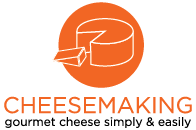Downloads
Dosage and pack size
- Large size (50UA in foil sachet) will inoculate 1500 to 5,000 litres of milk depending on dosage used (out of stock)
- Small size (5UA screw cap bottle which is 1/10th of a large pack) will inoculate 150 to 500 litres of milk depending on dosage used
- An approximate guide for usage is 1 smidgen mini spoon or 1/32nd spoon to 8 litres of milk but this can be increased depending on the flavour profile you require.
Types of Cheese MA315 can be used on
All white mould such as Camembert, Brie and Triple Cream, Coulommiers, All Blue vein varieties, All wash rind varieties eg Raclette, Port Salut, Reblochon, Muenster Taleggio, Tilsit, All washed curd Semi Soft Styles eg Colby, Edam., Gouda, Havarti, Cream cheese, Tomme (made with mesophile), Sour cream, Quark, Fromage blanc, Chaource, Neufchatel, Chevre, Chèvre frais, St-Maure, St Marcellin, Valençay, Selles- sur- Cher, cultured butter, Mizithra, soft fresh cheeses, Faisselle, Reblochon, Lactic Acid Set cheeses, Pouligny St Pierre, Crottin, Jarlsberg (with mesophile culture culture), Manchego, Monterey Jack.
Description
MA315 is a single strain mesophilic culture, Lactococcus lactis ssp Lactis biovar. Diacetylactis. It has strong aromatic capabilities. MA315 is found in small volumes in M235, Flora Danica and M272. Additional MA315 can be added to create additional flavour, even if there is Lactococcus lactis ssp Lactis biovar. Diacetylactis already in the culture.
MA315 is not usually used as a single lactic culture, while it does produce lactic acid it will not produce enough lactic acid, so a lactic culture is needed to be added also. It produces diacetyl and ferments citrates and produces medium levels of carbon dioxide, so expect some small eye in your cheeses. You are not limited by a specific dosage level, but it is suggested that you start with a lower dosage and increase or decrease from that dosage depending on the finished flavour and aroma level that you require.
Optimum flavour and aroma development occurs between 18°C – 25°C but it will produce flavour several °C outside of this temperature range.
- Flavour profile: 4 out 5
- Acid production: <1 out 5

